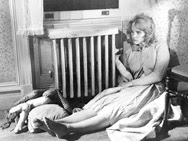My Favorite Films, Plague Edition (Volume 17): A Little-Known Gem from the 1960’s Art Scene

Something Wild (1961) Directed by Jack Gerfein Starring Carroll Baker and Ralph Meeker The early 1960s were an odd period in US film. The conservatism of the 1950's was still rampant, but the Kennedy election gave more of a view of the future to the public. While the big studios still dominated things, and there was very little “independent cinema”, even the big studios would sometimes experiment with some socially disruptive films like Rebel without a Cause (Warner Brothers 1955) or On the Waterfront (Columbia, 1954). These were edgy, but were made easier to sell by featuring young hunks like Marlon Brando and James Dean (more on them later). That any films with any social protest at all were made is remarkable, given McCarthyism and the blacklisting of the most creative Hollywood talent. This conservatism was still pretty much the status quo by 1960-1, where the big grossing films were studio spectaculars like Ben Hur and Spartacus . So what to make of Something Wi



